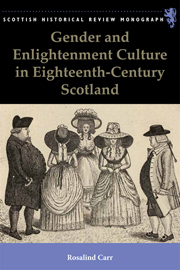Book contents
- Frontmatter
- Contents
- Acknowledgements
- List of Abbreviations
- Introduction: Gender and Scottish Enlightenment Culture
- 1 Masculinity, Homosociality and Intellectual Culture
- 2 Women and Intellectual Culture
- 3 Urbane and Urban Sociability in Enlightenment Edinburgh
- 4 Enlightened Violence? Elite Manhood and the Duel
- Conclusion
- Bibliography
- Index
3 - Urbane and Urban Sociability in Enlightenment Edinburgh
Published online by Cambridge University Press: 05 September 2014
- Frontmatter
- Contents
- Acknowledgements
- List of Abbreviations
- Introduction: Gender and Scottish Enlightenment Culture
- 1 Masculinity, Homosociality and Intellectual Culture
- 2 Women and Intellectual Culture
- 3 Urbane and Urban Sociability in Enlightenment Edinburgh
- 4 Enlightened Violence? Elite Manhood and the Duel
- Conclusion
- Bibliography
- Index
Summary
Describing the process of social change leading to civility, David Hume wrote in 1752:
The more these refined arts advance, the more sociable men become: nor is it possible, that, when enriched with science, and possessed of a fund of conversation, they should be contented to remain in solitude, or live with their fellow-citizens in that distant manner, which is peculiar to ignorant and barbarous nations. They flock into cities; love to receive and communicate knowledge; to show their wit or their breeding; their taste in conversation or living, in clothes or furniture. Curiosity allures the wise; vanity the foolish; and pleasure both. Particular clubs and societies are everywhere formed: Both sexes meet in an easy and sociable manner; and the tempers of men, as well as their behaviour, refine apace. So that, beside the improvements which they receive from knowledge and the liberal arts, it is impossible but they must feel an encrease [sic] of humanity, from the very habit of conversing together, and contributing to each other's pleasure and entertainment.
For Hume, refined urban sociability, or urbanity, indicated progress, and he uses it to assert European cultural superiority. Offering a Eurocentric vision of ‘barbarous nations’, Hume's depiction of the eighteenth-century European world is also misleading; rather than reading his description of things as they were, his vision needs to be understood as an ideal. It was the striving to reach and defend this ideal that underpinned the culture of improvement, which itself was fostered by Scottish Enlightenment philosophies of progress.
- Type
- Chapter
- Information
- Gender and Enlightenment Culture in Eighteenth-Century Scotland , pp. 102 - 141Publisher: Edinburgh University PressPrint publication year: 2014



